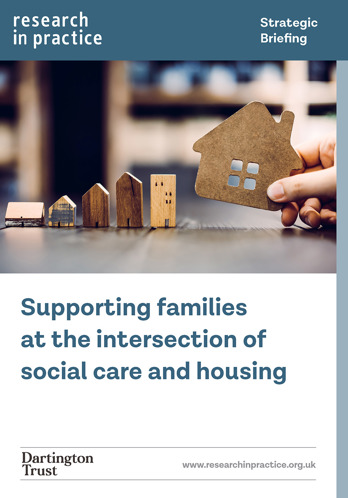Supporting families at the intersection of social care and housing: Strategic Briefing (2023)
Introduction
This strategic briefing presents an evidence base for supporting families at the intersection of social care and housing services. It is intended to help professionals across housing departments, children and families services, and adults social care, to work together with families who have overlapping support needs in these areas. The briefing explains some of the challenges and opportunities which can emerge when different local authority departments support the same families at the same time.
This is a quick-read version of the Supporting families at the intersection of social care and housing: Strategic Briefing (2023), which highlights its key messages. To gain a greater understanding of the topic you can download and read the full briefing, which includes references.
The briefing is part of the Families and Homes Change Project. This project was established in response to growing awareness in research and practitioner communities that while the housing and social care needs of families are often interrelated, efforts to support them can be fragmented across sectors that do not always work closely together, sometimes resulting in conflicting policy and practice. The Change Project brought together key stakeholders from each area to formulate responses, solutions and tools to support joint working across these statutory services.
The socio-economic context for the Families and Homes Change Project is a structural housing crisis in England which is pushing more families into poor quality accommodation and homelessness and, in turn, generating increased demand for social care services (Association of Directors of Children’s Services, 2018; Cross et al., 2021).
In this context, families’ housing and social care needs inevitably overlap. For example, when families are homeless, the provision of temporary accommodation may provide housing relief, but it can also exacerbate stress and disrupt family life in other ways, through placements away from home communities and support networks, strict visiting arrangements for family members, and potential risks from other residents/their associates (Sen et al., 2022a; Children’s Rights Alliance for England [CRAE] et al., 2018).
Furthermore, while domestic violence and abuse (DVA) feature prominently amongst families with housing and social care needs, the support services offered can at times feel disjointed. Bimpson et al.’s (2020) research with homeless mothers who had experienced DVA found that they sometimes had no choice but to remain in an unsafe situation through lack of housing assistance. Additionally, these mothers rarely received housing assistance until after they were separated from their children, at which point they ceased to be viewed as a ‘family’ by housing professionals, and so were not supported to access accommodation suitable for family reunification.
Carefully coordinated and cohesive support from housing and social care services can therefore be key to keeping families safe and together. To support this vision, the briefing sets out four proposals for change:
- An end to siloed working: Effective inter-organisational collaboration between housing and social care services means working across professional boundaries. This needs to be underpinned by professional respect and trust between departments, as well as an understanding of other teams’ roles, responsibilities and duties.
- Hearing the voice of the family: Effective practice involves hearing the voice of lived experience, identifying what is important to the individual, sharing reflections about possibilities and demonstrating professional curiosity about history - about the ‘there and then’ and the ‘here and now’ of their human story (Preston-Shoot, 2020).
- Improving prevention and early intervention: Early intervention can help to prevent an emerging problem from becoming a crisis for a family requiring more serious intervention. Closer collaboration between housing and social care services can increase opportunities to support families with overlapping needs sooner.
- Promoting legal literacy: Enabling professionals to work together, within closely aligned legal and policy frameworks, can maximise the opportunity for successful outcomes across housing and social care. Awareness of how discharging duties can impact upon other services can enable proactive measures to be put in place early.
Evidence demonstrates that the service landscape for families can be difficult to navigate and hampered by points of tension, where the policy and practice frameworks of the different sectors can pull in different directions (Bimpson et al., 2022). Understanding these challenges provides opportunities for services to work together to respond effectively to households at the intersection of social care and housing.
This briefing therefore encourages managers and strategic leads to reflect on the ways in which working practices and organisational structures within their local authorities could have detrimental consequences for families and identify opportunities for better collaboration and improved service delivery. It also presents learning which will be relevant to practitioners, practice supervisors, and commissioners working in in housing and social care.
It has been clear from engagement with housing and social care professionals as part of the Change Project process that there is a great desire to confront the challenges, and commitment and energy to make the changes necessary to address them. This briefing is a starting point in these efforts, setting out some key learning points and urgent priorities for change that can help guide efforts to improve the support journeys, experiences and outcomes for some of the most marginalised families.
This strategic briefing is complemented by other Research in Practice resources, as available below.
Professional Standards
PQS:KSS - Organisational context | Child and family assessment | Relationships and effective direct work | Developing excellent practitioners | Shaping and influencing the practice system | Effective use of power and authority | Purposeful and effective social work | Creating a context for excellent practice | Designing a system to support effective practice | Developing excellent practitioners | The role of social workers | Effective assessments and outcome based support planning | Direct work with individuals and families | Organisational context | Developing confident and capable social workers | Assuring good social work practice and development | Influencing and governing practice excellence within the organisation and community
CQC - Safe | Effective | Caring | Responsive | Well-led
PCF - Professionalism | Rights, justice and economic wellbeing | Knowledge | Intervention and skills | Values and ethics | Diversity and equality | Contexts and organisations | Critical reflection and analysis | Professional leadership
RCOT - Understanding relationship | Service users | Collaborative | Identify needs
References
Association of Directors of Children’s Services Ltd [ADCS]. (2018). Safeguarding Pressures Phase 6: Research report. ADCS. https://adcs.org.uk/assets/documentation/ADCS_SAFEGUARDING_PRESSURES_PHASE_6_FINAL.pdf
Bimpson, E., Parr, S., & Reeve, K. (2022). Governing homeless mothers: the unmaking of home and family, Housing Studies 37(2), 272-291. https://doi.org/10.1080/02673037.2020.1853069
Bimpson, E., Reeve, K., & Parr, S. (2020). Homeless mothers: Key research findings. UK Collaborative Centre for Housing Evidence (CaCHE). https://housingevidence.ac.uk/publications/homeless-mothers-key-research-findings
Children’s Rights Alliance for England (CRAE). (2018). Children speak out on homelessness. Children’s Rights Alliance for England.
https://crae.org.uk/sites/default/files/uploads/462614-CRAE_CHANGE-IT-REPORT-Digital-final.pdf
Cross, S., Bywaters, P., Brown, P., & Featherstone, B. (2021). Housing, homelessness and children’s social care: Towards an urgent research agenda. The British Journal of Social Work, 52 (4) 1988–2007.
https://doi.org/10.1093/bjsw/bcab130
Preston-Shoot, M. (2020). Adult safeguarding and homelessness: A briefing on positive practice. Local Government Association. www.local.gov.uk/sites/default/files/documents/25.158%20Briefing%20on%20Adult%20Safeguarding%20and%20Homelessness_03_1.pdf
Sen, R., Smeeton, J., Thoburn, J., & Tunstill, J. (2022a). Social work with families who are homeless or who have housing needs: A reflective guide for social workers and social work managers. BASW England.
www.basw.co.uk/system/files/resources/181227_basw_england_homelessness_guidance_full_version.pdf





